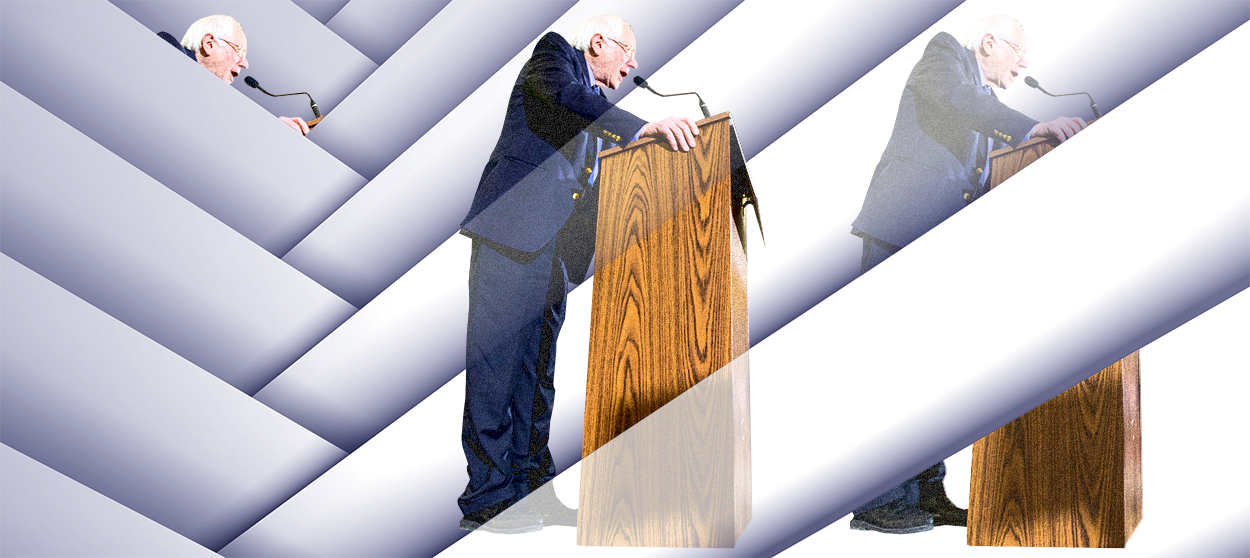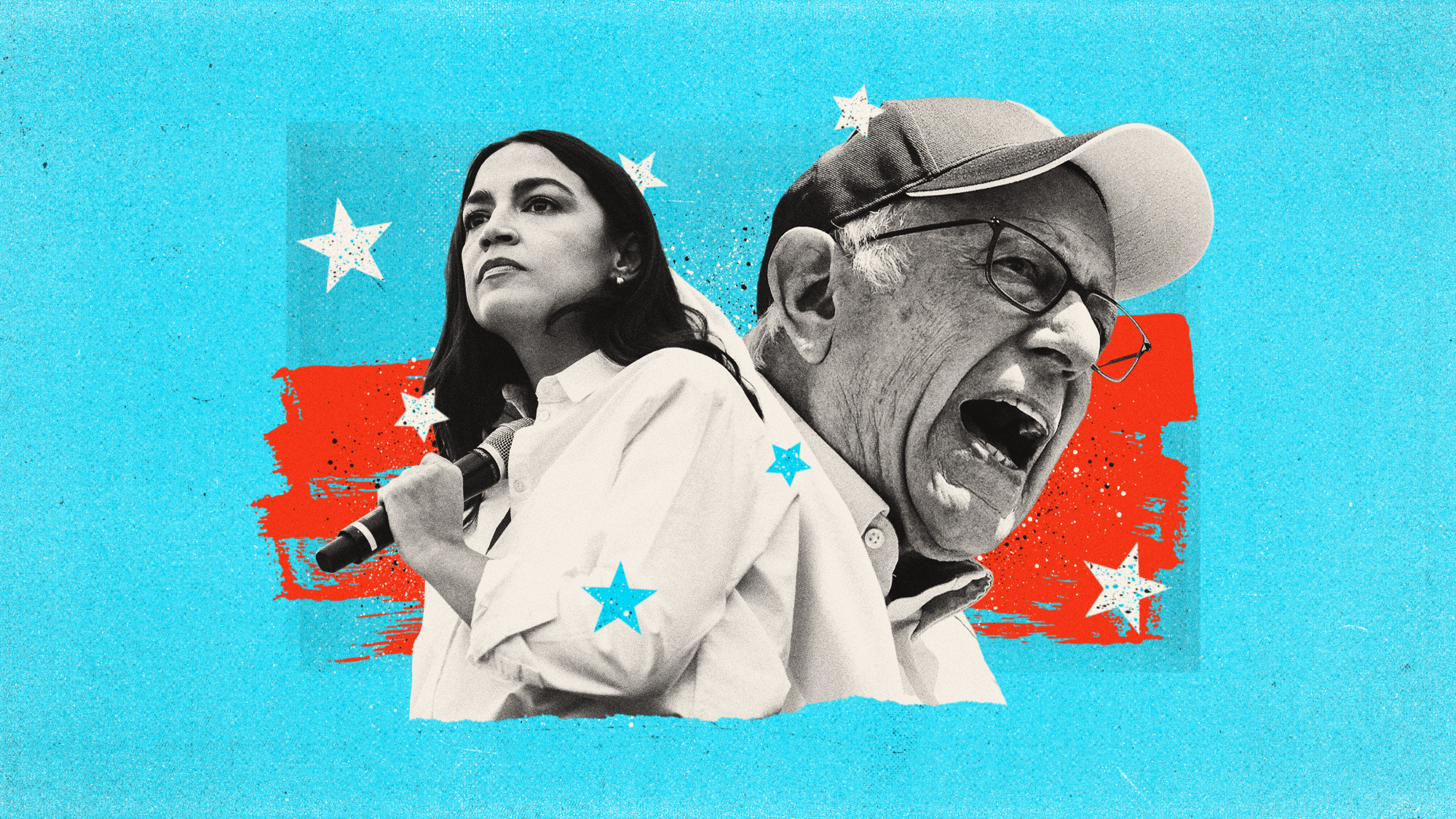The Democratic Party is not going nuts. It's coming to its senses.
Bernie Sanders understands that big problems require big solutions


A free daily email with the biggest news stories of the day – and the best features from TheWeek.com
You are now subscribed
Your newsletter sign-up was successful
Is the Democratic Party becoming a mirror image of Donald Trump's Republican Party? Galloping leftist "extremism" — helped along by the populist rhetoric of Bernie Sanders and Alexandria Ocasio-Cortez — has centrists and conservatives fainting like myotonic goats at a fireworks show, from Dana Milbank at The Washington Post to former George W. Bush speechwriter Peter Wehner at The Atlantic.
However, Wehner's alarmist article inadvertently demonstrates the problem with this kind of panic-mongering — a lack of real consideration whether Sanders might be right about anything, or whether his politics fit at all with America's previous traditions. In reality, the growing Sanders tendency in the party mostly reflects it coming to its senses.
"To more fully grasp the leftward lurch of the Democratic Party," writes Wehner, his glasses steaming up in outrage, he runs through a list of Sanders-style policies. He asserts they would be "fiscally ruinous, invest massive and unwarranted trust in central planners, and weaken America's security."
The Week
Escape your echo chamber. Get the facts behind the news, plus analysis from multiple perspectives.

Sign up for The Week's Free Newsletters
From our morning news briefing to a weekly Good News Newsletter, get the best of The Week delivered directly to your inbox.
From our morning news briefing to a weekly Good News Newsletter, get the best of The Week delivered directly to your inbox.
First up is the Green New Deal. After describing it at least somewhat fairly as an effort to de-carbonize the economy as fast as possible while making it more egalitarian, he writes: "It would be astronomically costly and constitute by far the greatest centralization of power in American history." That's the sum total of his argument against it.
As usual for self-style moderates, Wehner does not even attempt to grapple with the threat posed by climate change, nor consider how much might be worth paying to stop it. The cost of a Green New Deal would be large, but so would letting half of south Florida drown. Freaking out about cost when facing clockwork costly climate disasters is an elementary failure of reasoning.
Meanwhile, describing a Green New Deal as an unprecedented centralization of power is historically illiterate. During the Second World War, the government routinely nationalized whole industries, conducted economy-wide price controls and rationing, and, you know, conscripted millions of men into the military to fight and die. The Green New Deal would involve some flexing of government power to be sure, but probably not even on the scale of the original New Deal. For instance, at its height in the mid-1930s, the Public Works Administration alone was consuming half the concrete output and one-third of the steel output of the entire country. The Green New Deal would have to be very big, but probably not that big.
In sum, Sanders is building on a cherished Democratic Party tradition (whose construction projects are still being used to this day across the country) to address a critical policy emergency. Scared yet??
A free daily email with the biggest news stories of the day – and the best features from TheWeek.com
Next up is Medicare-for-all, which Wehner asserts would be unpopular because of an insurance industry study showing 70 percent of people on employer-sponsored insurance are happy with it, and because the plan "would exacerbate the worst efficiencies of an already highly inefficient program."
This first point is deceptive, and the second is straight-up backwards. It's true that, per Gallup, 69 percent of people with employer-based coverage do say they are satisfied with it — but 77 percent of people on Medicare say the same thing. (Seniors aren't generally thrown into a panic when they turn 65 and get pretty good guaranteed coverage for the rest of their life.)
As for efficiency, the fragmented and heavily employer-based American insurance system is already by far the most wasteful in the world. Relative to the second-most expensive country, Switzerland, we spend about 5 points of GDP extra — or a trillion bucks, every year. Medicare is considerably more efficient than private coverage, with lower prices and much lower administrative spending. With some reforms — particularly allowing negotiation with drug companies — it could be more efficient still. Wehner simply doesn't know what he's talking about.
So Sanders understands correctly that the janky employer-based health care system is slowly crushing the economy and proposes building on one of the greatest successes of President Lyndon Johnson to fix it. Everyone hide under the bed!!
Taking on every one of Wehner's points would require several articles, but just one more thing: He complains that Sanders Democrats are showing "Increasing antipathy aimed at Israel, one of the most estimable nations in the world." Why the most high-profile Jew in American politics might question unswerving obedience to a corrupt government, aligned with violent racists, which works hand-in-glove with Democrats' partisan opponents, is left as an exercise for the reader.
To be sure, a President Bernie Sanders would probably be the furthest-left president in history, surpassing Franklin Roosevelt by a bit. But FDR was also the best president in history — unlike Wehner, a man who recognized that large problems like economic depression and global war against fascism require large solutions. Indeed, in some areas Sanders is to his right — his proposed 70 percent top marginal tax rate is far short of FDR's 94 percent rate (much less the maximum income he tried to pass), and bites in at a much higher income.
As such, Sanders is squarely within the reformist-radical American tradition — someone who wants to build on previous accomplishments to make the United States a more decent and equal society. It's as simple as that.
Ryan Cooper is a national correspondent at TheWeek.com. His work has appeared in the Washington Monthly, The New Republic, and the Washington Post.
-
 Properties of the week: pretty thatched cottages
Properties of the week: pretty thatched cottagesThe Week Recommends Featuring homes in West Sussex, Dorset and Suffolk
-
 The week’s best photos
The week’s best photosIn Pictures An explosive meal, a carnival of joy, and more
-
 The ‘ravenous’ demand for Cornish minerals
The ‘ravenous’ demand for Cornish mineralsUnder the Radar Growing need for critical minerals to power tech has intensified ‘appetite’ for lithium, which could be a ‘huge boon’ for local economy
-
 The billionaires’ wealth tax: a catastrophe for California?
The billionaires’ wealth tax: a catastrophe for California?Talking Point Peter Thiel and Larry Page preparing to change state residency
-
 Mamdani vows big changes as New York’s new mayor
Mamdani vows big changes as New York’s new mayorSpeed Read
-
 Bari Weiss’ ‘60 Minutes’ scandal is about more than one report
Bari Weiss’ ‘60 Minutes’ scandal is about more than one reportIN THE SPOTLIGHT By blocking an approved segment on a controversial prison holding US deportees in El Salvador, the editor-in-chief of CBS News has become the main story
-
 Has Zohran Mamdani shown the Democrats how to win again?
Has Zohran Mamdani shown the Democrats how to win again?Today’s Big Question New York City mayoral election touted as victory for left-wing populists but moderate centrist wins elsewhere present more complex path for Democratic Party
-
 Millions turn out for anti-Trump ‘No Kings’ rallies
Millions turn out for anti-Trump ‘No Kings’ ralliesSpeed Read An estimated 7 million people participated, 2 million more than at the first ‘No Kings’ protest in June
-
 Ghislaine Maxwell: angling for a Trump pardon
Ghislaine Maxwell: angling for a Trump pardonTalking Point Convicted sex trafficker's testimony could shed new light on president's links to Jeffrey Epstein
-
 The last words and final moments of 40 presidents
The last words and final moments of 40 presidentsThe Explainer Some are eloquent quotes worthy of the holders of the highest office in the nation, and others... aren't
-
 The anger fueling the Bernie Sanders and Alexandria Ocasio-Cortez barnstorming tour
The anger fueling the Bernie Sanders and Alexandria Ocasio-Cortez barnstorming tourTalking Points The duo is drawing big anti-Trump crowds in red states
